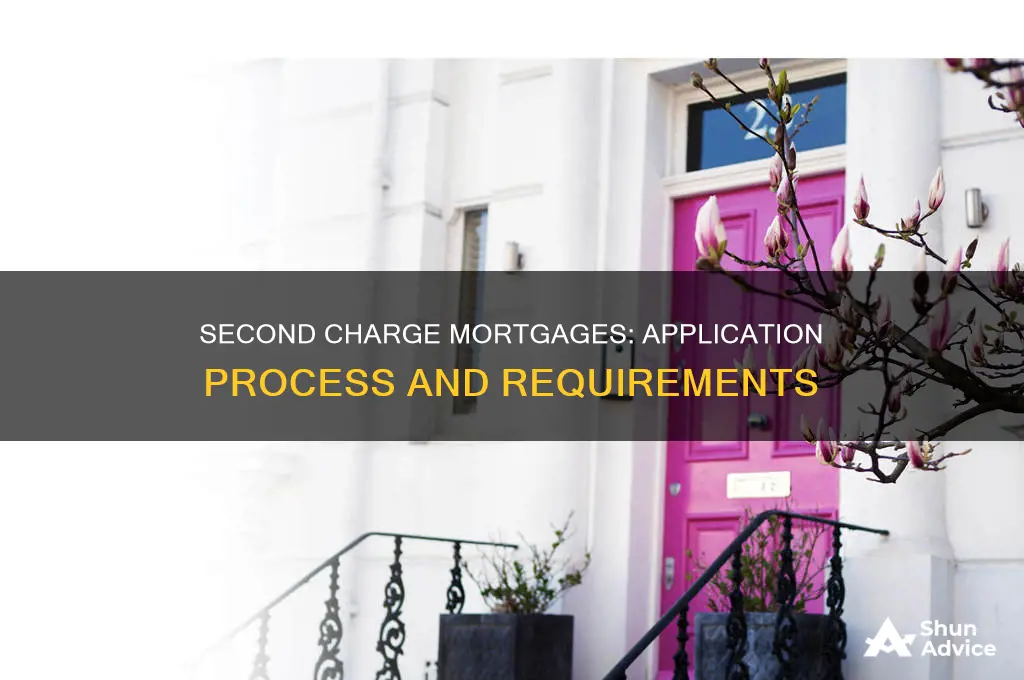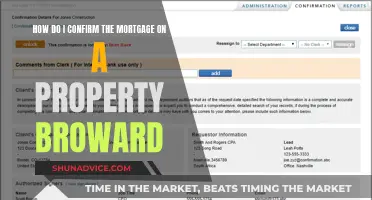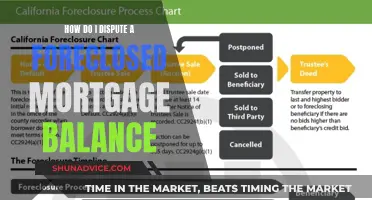
Applying for a second charge mortgage can be a daunting process. A second charge mortgage is a method for releasing funds from a property, whether residential or buy-to-let. It allows you to use any equity you have in your property as security against another loan. This means you will have two mortgages on your property. Before applying for a second mortgage, it is important to check your credit report for errors or issues that could impact your chances of approval. You will also need to have enough equity in your home to qualify for a second mortgage. This means that the value of your home must be higher than the outstanding balance on your first mortgage. When you have found a lender and are ready to apply, you will need to supply financial information, including payslips, recent statements, and your latest mortgage statement. You will also need proof of your identity and address.
| Characteristics | Values |
|---|---|
| Purpose | To release funds from a property |
| Type of Loan | Secured loan |
| Repayment | Monthly payments that cover the monthly interest on the loan and a proportion towards reducing the loan itself |
| Eligibility | Value of the property, debt-to-income ratio, credit history, income, and existing mortgage |
| Affordability | Lenders will evaluate other outgoings such as credit card repayments and household expenditures |
| Documents | Payslips, recent statements, latest mortgage statement, proof of identity and address, deed of consent from the first-charge mortgage lender, valuation report, and conveyancing solicitor |
| Fees | Administration fee, solicitor's fee, discharge fee, arrangement fees, and early repayment charges |
| Interest Rate | 3% to 12% |
| Risk | Losing your home |
| Other Options | Remortgaging, unsecured products such as personal loans, or a further advance from the current lender |
What You'll Learn

Eligibility requirements
To be eligible for a second charge mortgage, you must be a homeowner with enough equity in your property. This will determine how much you are eligible to borrow. Lenders will also need to ensure you can afford the loan, so they will carry out affordability and credit checks.
Before applying for a second charge mortgage, it is recommended that you check if you can get a further advance on your existing mortgage first and get advice from a suitably qualified adviser. They will help you find the loan that best suits your needs and financial situation. They will also ensure you are aware of the risks of taking out a second charge mortgage. For example, if you fall behind on your repayments, the lender could repossess your property to recover the money owed.
If you decide to proceed with a second charge mortgage, you will need to supply financial information, including payslips, recent statements, and your latest mortgage statement. You will also need proof of your identity and address. Before your second-charge mortgage can proceed, you will need an agreement in writing from your first-charge mortgage lender; this is known as the deed of consent. You might also need a valuation and conveyancing solicitor.
Second charge mortgages are generally considered a more flexible option than remortgaging and can be useful when significant amounts of money are needed relatively quickly. Reasons for applying for a second charge mortgage may include:
- Difficulties qualifying for unsecured loans
- Needing to raise more money than is available from remortgage products
- If you are tied to a mortgage product with penalties for early repayment
- If you are benefiting from a low-interest-rate mortgage that you do not want to repay but need to raise additional capital
- If you are raising money for business purposes, which is not normally available from a remortgage
Adding Your Name to a Mortgage: What You Need to Know
You may want to see also

Application fees
Administration Fees:
Administration fees, also known as processing fees, are commonly charged by lenders to cover the administrative costs associated with managing your loan application. These fees are usually non-refundable and payable at the beginning of the application process. The amount can vary, with some lenders charging a flat fee, such as £75, while others may charge a percentage of the loan amount (1%-2%). These fees cover document preparation, notary fees, and legal costs associated with the application.
Application or Processing Fees:
Lenders may charge an application or processing fee simply for initiating the mortgage application. This fee can vary significantly and may be influenced by the type of loan you are applying for. It is important to note that some lenders may charge a nominal fee or no fee at all, so shopping around for competitive rates is advisable. The fee can range from $300 to $500, or it may be equivalent to a percentage of the loan amount.
Valuation or Appraisal Fees:
Lenders typically require a property valuation or appraisal to determine the loan-to-value ratio and the value of the property. This fee is usually paid upfront and can vary depending on the property and the lender's requirements. Some Mortgage Advisers may include this valuation fee within their overall service cost, while others may ask you to pay for it separately.
Solicitor's Fees:
As a second-charge mortgage involves legal documentation, you may need to pay a solicitor's fee. This fee is typically in the range of £75 and is payable either at the beginning of the application process or after the lender has agreed in principle to the loan. The solicitor will review the legal documents to ensure they comply with the requirements of the second-charge mortgage.
Discharge or Settlement Fees:
When closing your second-charge mortgage account, you may encounter discharge or settlement fees. These fees cover the administrative costs associated with closing the account and releasing the property from the lender's charge. The amount can vary, but it is typically mentioned in your mortgage offer document.
It is important to carefully review all loan and application documents, ask for clarification on any questionable charges, and compare fees across different lenders to make an informed decision.
Adding Your Adult Son to Your Mortgage: What You Need to Know
You may want to see also

Paperwork and documents
The paperwork and documentation required for a second-charge mortgage application can vary from lender to lender. However, there are several documents that you will typically need to provide.
Firstly, you will need to prove your identity. This can be done by providing an original passport or driving licence, although some lenders may use face recognition apps. You will also need to provide proof of your address.
Secondly, you will need to prove your income to ensure you can afford the second mortgage. This can be done by providing payslips, tax returns, and bank statements. If you are self-employed, you may need to provide HMRC documentation. You may also need to provide details of your current mortgage and any other financial commitments.
Thirdly, the lender will need to confirm the value of your property. This can be done by providing a copy of a recent valuation of the property.
You may also be asked to provide a list of any credit you wish to clear if you are consolidating unsecured credit. Some lenders may also require proof of the purpose of the loan, such as quotes for home improvements.
It is important to note that a second-charge mortgage application will also include a credit check and an affordability assessment to determine the risk involved in lending to you. As part of the underwriting process, the lender will assess your income and outgoings, credit record, and other information.
Working with a qualified mortgage broker can be helpful in navigating the second-charge mortgage process. A broker can advise on the paperwork required, guide you through your options, and match your requirements with appropriate lenders.
Applying for a HARP Mortgage: A Step-by-Step Guide
You may want to see also

Lender considerations
When applying for a second-charge mortgage, lenders will run an affordability check to ensure you can make the monthly payments on your current mortgage and the second one. They will consider your credit score, income, and outgoings. Lenders will also evaluate your other financial commitments, such as credit card repayments and household expenses, to determine whether you can comfortably afford the second-charge loan repayments.
The amount you can borrow with a second-charge mortgage will depend on the amount of equity you own in your home. Lenders will assess the current valuation of your property and the level of equity to determine if there is enough to satisfy their lending requirements. Up to 75% of the equity in your property is a good indicator of the amount a lender will allow you to borrow.
Lenders will also consider your employment history and debt-to-income ratio. They will assess your ability to meet future mortgage payments by conducting stress tests, similar to those for a first-charge mortgage. It is important to note that interest rates for second-charge mortgages tend to be higher than those for first mortgages due to the increased risk for lenders.
Before approving a second-charge mortgage, lenders will require an agreement in writing from your first-charge mortgage lender, known as the deed of consent or deed of postponement. This ensures that your existing lender is aware of and agrees to the second-charge mortgage.
Additionally, lenders may request a subsequent change questionnaire and details about your first-charge mortgage. They may also charge an administration fee to cover the cost of processing your application, which is typically non-refundable.
Adding Your Daughter to Your Mortgage: What You Need to Know
You may want to see also

Pros and cons
A second charge mortgage can be a useful financial tool, but it comes with both advantages and disadvantages. Here are some of the pros and cons to help you decide if it is the right option for you.
Pros
- You can access additional funds without refinancing your existing mortgage. This can be beneficial if your current mortgage has favourable terms that you want to keep.
- Second charge mortgages often have lower interest rates than unsecured loans or credit cards, making them a more affordable option for debt consolidation.
- They offer flexibility in terms of loan amounts and repayment periods. You can borrow a larger sum than you might with a personal loan, and repayment terms can be tailored to your financial situation.
- They can be a cost-effective way to pay for home improvements, settle a major bill, or consolidate debt.
- There can be tax benefits, as the interest paid on a second mortgage may be tax-deductible, especially if the funds are used for home improvements.
- You can release equity from your property without needing to remortgage or change the terms of your first mortgage.
- You won't be restricted by the limited criteria of a Further Advance on your current mortgage.
Cons
- The application process can be complex and time-consuming, involving property valuations, legal checks, and extensive documentation.
- A second charge mortgage increases your total debt burden, which can strain your finances and make it challenging to manage overall debt, especially if interest rates rise.
- They typically have higher interest rates than first mortgages because they are considered higher risk by lenders.
- There are often additional fees, including arrangement fees, valuation fees, and legal costs, which can make the overall cost of borrowing higher.
- They will be listed on your credit history, and you must inform your current mortgage lender. They may be viewed unfavourably by other potential lenders, increasing the cost of future borrowing.
- As they are secured against your property, failure to keep up with repayments could result in the repossession of your home, even if you are up to date with your first mortgage.
Mortgage and Marriage: Adding a Spouse to Home Loans
You may want to see also
Frequently asked questions
A second charge mortgage is a method for releasing funds from a property. It is a secured loan, meaning that the loan debt is secured against your property. This type of mortgage is taken out in addition to a first charge mortgage, meaning you will have two mortgages on your property.
To apply for a second charge mortgage, you will first need to find and decide on a lender. You can use a free online tool to check your eligibility and identify suitable lenders. Once you have found a lender, you will need to supply financial information, including payslips, recent statements, and your latest mortgage statement. You will also need proof of your identity and address.
The requirements for a second charge mortgage will vary depending on the lender and your financial situation. Generally, you will need to have sufficient equity in your home, a good credit score, and a low debt-to-income ratio.
Second charge mortgages may come with additional fees and charges, such as arrangement fees and early repayment charges. There may also be administration fees and solicitors' fees. It is important to carefully review the terms and conditions to understand all the fees involved.
Taking on additional debt always comes with risks. If you default on the loan, you could lose your home. It is important to consider the potential consequences and ensure you can afford the repayments. The interest rates on a second charge mortgage can also be higher than those on a first charge mortgage.







